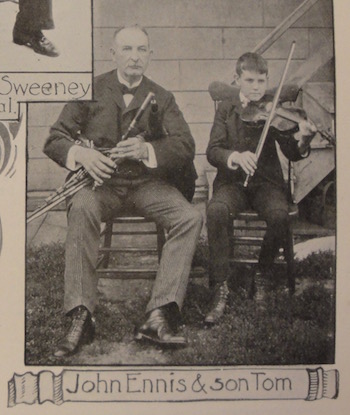Bonny Bunch of Roses (2) (The)
BONNIE BUNCH OF ROSES [2]. Irish, Air (4/4 time). D Major. Standard tuning (fiddle). AAB. The 'bonny bunch of roses' were the prize Napoleon strove for, but could not conquer--England, Wales, Ireland and Scotland. One of the most widespread of Napoleonic songs, it takes the form of a conversation between Marie Louise and her son and gives the highlights of Napoleon's life, though emphasizing the retreat of the Grand Army from Russia. The ambitions of the young Napoleon reflect that of his father. It begins:
By the margins of the Ocean, one morning in the month of June,
Where feathered, warbling, songsters, their charming notes did sweetly tune.
There I beheld a female, she seemed to be in great grief and woe,
Conversing with young Bonaparte,
Concerning the bonny bunch of roses, O.
Although popular in England, it is considered that the song originally was Irish in origin (see "Little Bunch of Rushes (The)"). . See also "Bunch of Roses (3)" and Joyce's (1909) "Blackbird (The)," and Bunting's "Little Bunch of Rushes (The)", O'Farrell's "Bunch of Rushes (2) (The)," and O'Neill's Little Bench of Rushes (1)(all variants).

Source for notated version: Chicago piper and flute player John Ennis, originally from Kildare. Ennis was a policeman and sometime journalist and became president of the Chicago Irish Music Club after Francis O'Neill [O'Neill].
Printed source: O'Neill (Music of Ireland: 1850 Melodies), 1903; No. 126, p. 22.
Recorded sources: Claddagh 4CC 32, Willie Clancy - "The Pipering of Willie Clancy, vol. 1" (1980). Island ISLP9432, The Chieftains - "Bonaparte's Retreat" (1976).
X:1 T:Bonnie Bunch of Roses [2] M:C L:1/8 R:Air N:"Moderate" S:O'Neill - Music of Ireland (1903), No. 126 Z:AK/Fiddler's Companion K:D A2|d3e f2e2|d3c A2F2|G2 AB cABG|A2D2D2:| ||FG|A2A2 c>AG>B|A2 A>G A2 d>e|f2g2 a>g fe|d>c AG A2 d>e| f2g2 a>g fe|d3e f2 AF|G2 AB cABG|A2 D2D2||
© 1996-2010 Andrew Kuntz. All Rights Reserved.
Engraver Valerio M. Pelliccioni

